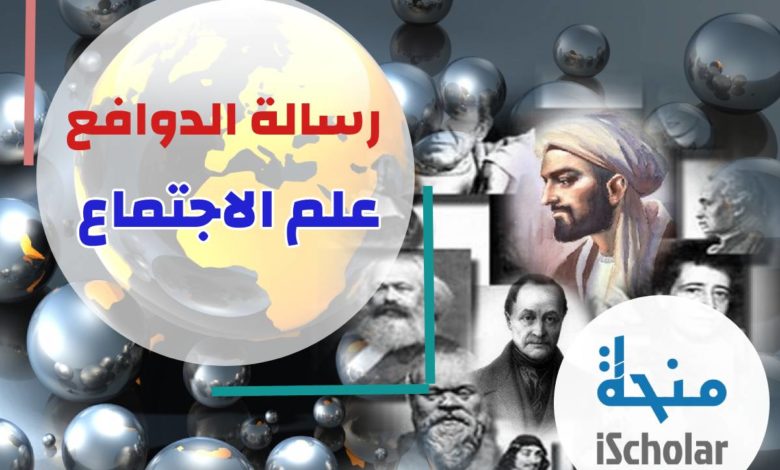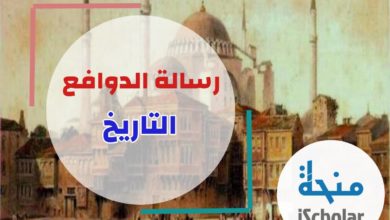
نقدم لكم في هذه المقالة شرحا كافيا عن كيفية كتابة رسالة الدوافع لاختصاص علم الاجتماع مع نموذج حقيقي للاستعانة به من أجل كتابة خطاب تحفيزي يساهم بشكل كبير في الحصول على منحة للدراسة في جامعات الخارج.
علم الاجتماع مميز عن باقي العلوم إذ تستطيع من خلال دراسته الانتساب لعدة وظائف مثل (مستشار اجتماعي, مدرس تعليمي,عامل إغاثة دولي,مسؤول سياسي,باحث اجتماعي).
تفاصيل رسالة الدوافع لاختصاص علم الاجتماع :
حتى تستطيع إقناع لجنة القبول في أي جامعة يجب أن تعرف كيف تكتب رسالة دوافعك ونحن سنساعدك في ذلك من خلال تقديم بعض النصائح الهامة لخطاب تحفيزي مميز وبارز,إليك بعض النصائح التي يجب أن تتضمنها رسالة الدوافع لعلم الاجتماع:
- يجب أن تصف رسالتك الدوافع نقاط قوتك ومهاراتك وخططك لحياتك المهنية.
- يجب أن تشعر لجنة القبول بشغفك ورغبتك في دراسة علم الاجتماع.
- يجب التزام الدقة والابتعاد عن الكذب.
- إثبات رغبتك بدراسة اختصاص علم الاجتماع بأمثلة واقعية وحية قادرة على إقناع لجنة القبول.
- تضمين رسالتك بخبراتك وطموحاتك وهواياتك والأنشطة اللامنهجية التي قمت بها ذات الصلة بمجال علم الاجتماع.
- تحدث عن خبرة عمل ذات صلة بعلم الاجتماع مثل متابعة عامل اجتماعي وصف عن هذه التجربة.
- الإجابة عن الأسئلة التالية:
- ماالذي دفعك لعلم الاجتماع سواء كان موقف أو تجربة أو أحد أفراد العائلة؟
- هل تشعر أنك تتمتع بصفات وسمات جيدة لتكون طالب علم اجتماع جيد؟
- ما هي الأهداف المستقبلية من دراسة علم الاجتماع والأثر الذي تستطيع تقديمه في الجامعة؟
- ماهو السبب وراء اختيارك لهذه الجامعة بالذات؟
نموذج رسالة الدوافع لعلم الاجتماع:
هذا النموذج حقيقي مقدم من أحد الطلاب لجامعة كامبريدج -العلوم الاجتماعية والسياسة ( لانستطيع التصريح عن بياناته الشخصية) يمكنك الاستئناس به من أجل كتابة رسالة دوافع مميزة.
A trip to Mexico at age twelve sparked my interest in the social sciences. The level of poverty and governmental corruption jarred me whilst there, and thus my determination to understand why social injustice occurs and how to combat it formed. From this, a fascination with politics and society emerged
As a result, I browsed through texts such as “Globalization and Human Rights” by Alison Brysk, read lectures like Amartya Sen’s “Global Inequality and Human Security” and explored books introducing me to political philosophy, sociology and psychology – all of which helped me try to understand the root of world problems
Brysk’s book enabled me to discover the link between globalisation and human rights violations worldwide. I realised that while certain forms of globalisation have had positive effects on developing countries, there’s still a strong discrepancy between its so-called “winners and losers”
Watching John Pilger’s “War on Democracy” provided gripping evidence of this in Bolivia, where multinational corporations at one point managed to asset strip the country’s water supply
In addition, I found Sen’s lecture particularly persuasive,and agreed with him that whilst globalisation has lessened poverty and not made “the poor any poorer”, it’s still unjust that the impoverished receive only a piece – and not the fair share of -the cumulative benefits of globalisation
Furthermore, researching the works of political philosophers such as Machiavelli and reading books like “Affluenza” by Oliver James helped me explore the reasons why wealthy nations allow social injustice to take place and, at times,even indirectly encourage it
Machiavelli’s philosophy “the end justifies the means” reflects the attitude rich nations seem to have towards developing countries. “Affluenza” discusses the obsession with materialism in order to provide self-worth,paradoxically at the expense of one’s mental health and well-being of others -this being seen in globalisation’s effects on developing countries
My passion for human rights and politics was further supplemented by my participation in humanitarian initiatives such as Amnesty International,as well as in my other extra-curricular activities
In high school, I was the president and founder of an Amnesty International group.This experience taught me how NGOs work and helped me to understand globalisation’s positive effects on third-world countries -NGOs like Amnesty being one of them.
In addition, inspired by a trip to Rwanda two years after its 1994 genocide,I led the group on a campaign to end the genocide in Darfur, Sudan. My interest in Darfur remains, and I’m currently reading “Darfur: A New History of a Long War” to better understand the conflict. Furthermore, we worked on campaigns to end violence against women – initiating my interest in feminism – and ending the use of torture in the War on Terror
This specific campaign convinced me America shouldn’t have entered Iraq as the reasons for doing so were both ambiguous and dubious.Watching Charles Ferguson’s “No End in Sight”,where those involved in the initial Iraqi occupation authority express disillusionment with the Bush administration, has strengthened this belief
Finally, I debated for my high school’s debate club and wrote for its nationally award-winning newspaper, writing pieces where the topics ranged from mental health issues to terrorism.I received a letter of commendation from a local newspaper reporter for the latter
I enjoy a variety of activities in my spare time. I love to travel, as is evident from my transatlantic background, and have visited most of the continents
I like learning languages,and am presently refreshing my Spanish skills in addition to teaching myself some basic Hindi. Literature is a particular passion of mine, having helped form my previous school’s literary magazine.I am also interested in social psychology, and am currently researching the psychology behind consumerism
اقرأ أيضا:منحة أينشتاين للأبحاث في ألمانيا 2023
ننصحك بالاطلاع على:رسالة دوافع لاختصاص الهندسة
تصفح أيضا:منحة كوريا الجنوبية الحكومية 2022-2023











